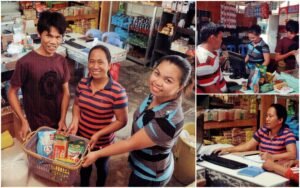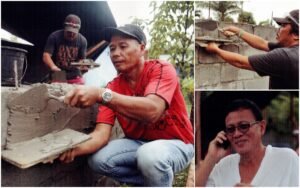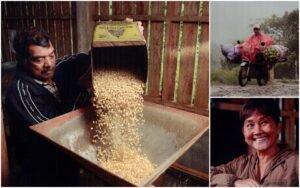
A cooperative and a women’s association show what working together means.
Along the highway in Davao City’s Baguio District stands a simple one-story structure built amidst tall trees and lush shrubbery. At the porch, three women are busy weaving colorful plastic strips into native baskets. To the left, a man and a woman are stacking canned goods and other dry items. At the nursery outside, some women are hunkered down to place seedlings inside small black plastic bags.
Life can be hectic in this idyllic location, but the members of the Baguio Workers’ Consumers Cooperative (BWCC) and the Baguio District United Women’s Association (BDUWA) won’t have it any other way.
The two groups were created simultaneously on March 8, 2016 with the intent of improving the lives of their respective members. BWCC started with 123, all of them regular workers at the nearby Dole Stanfilco banana plantation. Sonny Fuentes, the group’s president, says as a consumers cooperative, BWCC sells groceries, rice, and other items the members use at home. “Pangkonsumo lang (For their daily needs),” he says.
Kasilak was with the cooperative from the beginning, mentoring its leaders and helping process their development agenda. Dole Stanfilco lent a hand by providing an initial capital of which the group used to purchase its first stock. The company also gave the use of a property it had been renting in Malagos, Baguio District.
“This was unoccupied so the company offered it to us rent-free,” Sonny says. “Even the renovation was funded by the company. We just pay for electricity and water.” After just one year, BWCC is already earning an income, enabling it to give benefits to its members.
Sharing the property under a co-management arrangement is BDUWA, whose 13 active members make wise use of the space by engaging in five core businesses. The nursery is its top money-maker as Kasilak and other organizations continue to purchase seedlings for their tree-planting activities. “Our target this year is to provide 12,000 seedlings,” the association’s president, Carmen Daya, says. “And even that may not be enough.”
The association has talented weavers who create baskets, flower pots, and laundry hampers from plastic strips that had been used to pack bananas. They also string plastic beads together to make bags, wallets, and other personal items. With prices ranging from P80 to each, these add a significant income to the association.
BDUWA also sews protective clothing like masks, coveralls, and aprons for Dole Stanfilco workers. The project’s potential has been acknowledged by the Department of Labor and Ernployrnent (DOLE), which is evaluating a request made by Kasilak for five heavy-duty sewing machines as well as seed money for materials. Once approved, BDUWA can take the business full-blast.
As if all that weren’t enough, BDUWA recently entered the food business, accepting catering jobs for a number of seminars. It also plans to make processed food to be sold at the BWCC store. The women certainly have their hands full, but its partnership with the cooperative helps ensure that the ventures are successful.
BWCC and BDUWA are setting their sights high, but their feet are planted firmly on the ground. “We each have our roles,” Carmen says. “We can get there if we work together.”



